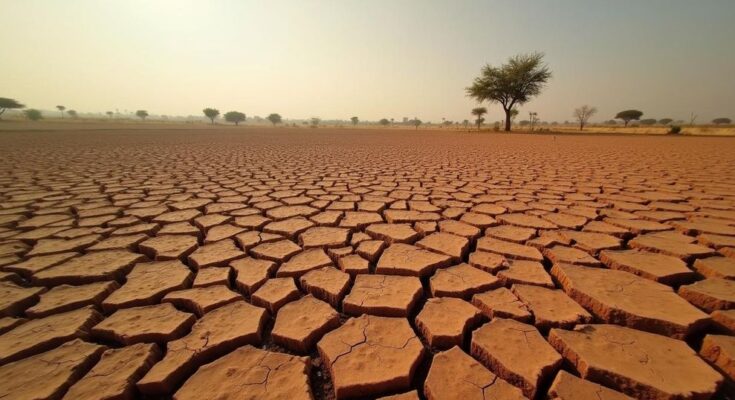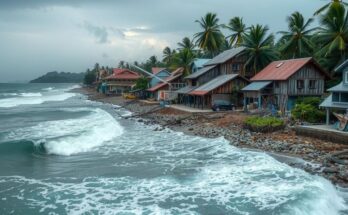Southern Africa is experiencing the worst drought in a century, affecting over 27 million people and resulting in severe malnutrition among 21 million children. A state of national disaster has been declared in several nations as the crisis worsens, with significant crop losses and disrupted electricity supply. Experts attribute the drought’s severity to climate change and related environmental factors, underscoring the urgent need for humanitarian intervention and climate resilience strategies.
Southern Africa is currently facing a catastrophic humanitarian crisis due to the worst drought in a century, as over 27 million individuals are severely affected, and 21 million children are suffering from malnutrition, according to the United Nations World Food Programme (WFP). Nations such as Lesotho, Malawi, Namibia, Zambia, and Zimbabwe have proclaimed a state of national disaster following the devastating impacts of prolonged drought, which has taken a significant toll on agriculture and livestock. The situation is dire, with further deterioration anticipated until the next harvests scheduled for March and April 2024. WFP spokesperson Tomson Phiri stated, “A historic drought – the worst food crisis yet – has devastated more than 27 million lives across the region. Some 21 million children are malnourished.” As October heralds the lean season in Southern Africa, each forthcoming month is expected to exacerbate food insecurity, with failed crops and depleted livestock leading to extreme hunger, where children reportedly receive as little as one meal per day. The crisis affects millions who depend on rain-fed agriculture for sustenance and income. The El Niño weather phenomenon has critically contributed to below-average rainfall across the region, with climate change compounding these effects. Lola Castro, WFP’s acting regional director for southern Africa, revealed the grim statistics: “It has wiped out 70 percent of the harvest in Zambia and 80 percent in Zimbabwe.” Moreover, reduced rain levels have adversely impacted hydropower capabilities, resulting in substantial electricity shortages. In response to limited resources, authorities in Namibia and Zimbabwe have made the controversial decision to cull wildlife, including elephants, to provide meat for the starving population. According to scientists, sub-Saharan Africa is particularly vulnerable to climate fluctuations due to its reliance on rain-dependent agricultural practices, and many impoverished countries lack the means to implement necessary climate-resilience strategies. Experts continue to raise alarms about droughts and erratic rainfall patterns leading to diminished agricultural output and posing threats to food security.
The ongoing drought crisis in Southern Africa is attributed to a combination of factors, primarily driven by climate change phenomena, including the El Niño effect, which has resulted in significant decreases in rainfall. This region primarily relies on rain-fed agriculture, making it highly susceptible to climatic variations. The implications of this drought extend beyond immediate food shortages, affecting energy production and prompting wildlife culls as a desperate measure to sustain human populations. With the UN highlighting the vulnerability of sub-Saharan Africa, the advocacy for urgent climate resilience measures has intensified, as the livelihoods of many depend on stable climate conditions and sufficient rainfall.
The dire situation emerging from the worst drought experienced in Southern Africa for a century has elicited widespread concern, with millions at risk of severe food insecurity and malnutrition. The combination of failed crops and livestock, coupled with rising challenges from climate change, necessitates urgent international attention and action to alleviate the impending humanitarian disaster and to build resilience against future climatic adversities in the region.
Original Source: www.aljazeera.com




